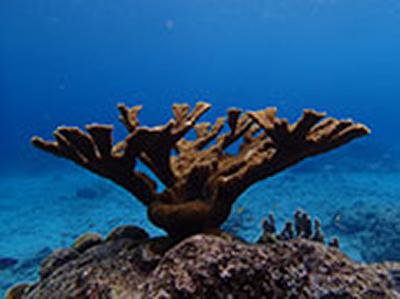Scientists highlight the importance of nutrients for coral reefs

A new publication from researchers at the University of Southampton and the National Oceanography Centre, Southampton highlights the importance of nutrients for coral reef survival.
Despite the comparably small footprint they take on the ocean floor, tropical coral reefs are home to a substantial part of all marine life forms. Coral reefs also provide numerous benefits for human populations, providing food for millions and protecting coastal areas from erosion. Moreover, they are a treasure chest of potential pharmaceuticals and coral reef tourism provides recreation and income for many.
Unfortunately, coral reefs are declining at an alarming rate. To promote management activities that can help coral reef survival, an international group of world renowned scientists have summarised the present knowledge about the challenges that coral reefs are facing now and in the future in a special issue of the journal Current Opinion in Environmental Sustainability.
The contribution of scientists from the University of Southampton to this special issue, which highlights the crucial role of nutrients for the functioning of coral reefs, can be freely downloaded from http://www.sciencedirect.com/science/article/pii/S1877343513001917
The University of Southampton researchers who are based at the Coral Reef Laboratory in the National Oceanography Centre, Southampton, explain that “too many” nutrients can be as bad for corals as “not enough”.
Professor Jörg Wiedenmann, Professor of Biological Oceanography at the University of Southampton and Head of the Coral Reef Laboratory, says: “The nutrient biology of coral reefs is immensely complex. It is important to distinguish between the different direct and indirect effects that a disturbance of the natural nutrient environment can have on a coral reef ecosystem.”
Since corals live in a symbiotic relationship with microscopically small plant cells, they require certain amounts of nutrients as “fertiliser”. In fact, the experimental addition of nutrients can promote coral growth. “One should not conclude from such findings, however, that nutrient enrichment is beneficial for coral reefs – usually the opposite is true,” explains Dr Cecilia D’Angelo, Senior Research Fellow in the Coral Reef Laboratory and co-author on the article.
Professor Wiedenmann, whose research on coral reef nutrient biology is supported by one of the prestigious Starting Grants from the European Research Commission, adds: “Too many nutrients harm corals in many different ways, easily outweighing the positive effects that they can undoubtedly have for the coral–alga association. Paradoxically, the initial addition of nutrients to the water column might result in nutrient starvation of the corals at a later stage. In this publication, we conceptualise the important role that the competition for nutrients by phytoplankton, the free-living relatives of the corals’ symbiotic algae, may have in this context.”
“Nutrient pollution will continue to increase in many coral reefs. Therefore, an important prerequisite to develop efficient management strategies is a profound understanding of the different mechanisms by which corals suffer from nutrient stress.”
A video about the coral reef lab facility can be viewed here.